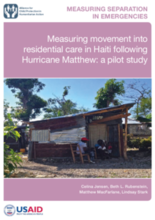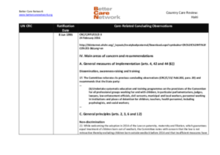This page contains documents and other resources related to children's care in the Americas. Browse resources by region, country, or category.
Displaying 1841 - 1850 of 3116
This article from the New York Times tells the stroy of Mirian, and other parents, who arrived to the U.S. from Central American and whose children were taken from them upon arrival.
The current study examines the relationship between foster mothers' parenting stress and coparenting relationship quality, and the moderating influence of foster caregiver role support.
Join International Social Service (ISS) for a free Live Chat for social workers on Wednesday, April 18th from 1-2pm EST.
With the support community and academic partners, a school-based health center administered by a Federally Qualified Health Center developed a plan for outreach, systematic screening and referral to services for newcomer youth.
The goal of this study was to investigate the levels of disagreement on adolescent mental health symptoms among caregivers and adolescents in foster care, to examine factors associated with caregiver–adolescent discrepancies, and the potential moderating role of caregiver–child closeness on the link between the length of time the youth lived with caregivers and discrepancies regarding adolescent mental health symptoms.
The purpose of this study was to determine the feasibility of evaluating movement of children into residential care following an emergency.
Data from extensive qualitative interviews (n = 67) and a survey instrument (n = 80) are used in this study to examine the perceived benefits experienced when organizations interact in community‐wide child welfare practice.
This country care review includes the care-related Concluding Observations adopted by the Committee on the Rights of the Child and the Committee on the Rights of Persons with Disabilities.
The current study implemented a concurrent, parallel mixed methods research design, whereby quantitative (survey) and qualitative (focus groups) data were collected simultaneously to explore: (a) the frequency of posttraumatic stress disorder, depression, suicidal ideation, and substance use, (b) trauma exposure at pre-migration, migration, and post-migration, and (c) how youth may cope with these adversities.
This article presents evidence for innovative service models from within and outside of the parenting literature that provide support to individuals and families in communities of poverty, highlighting aspects of service models that align with the needs of high poverty families.



